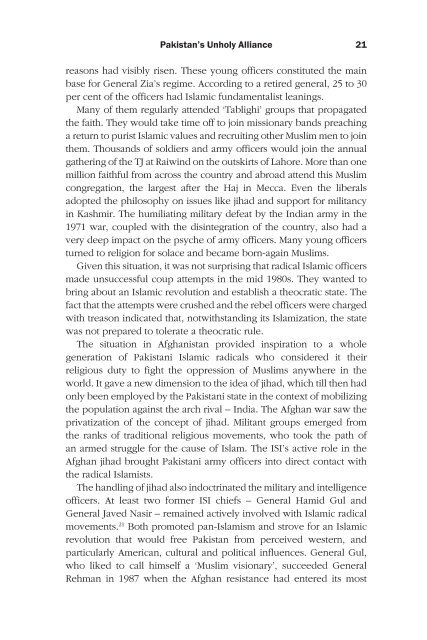Frontline Pakistan : The Struggle With Militant Islam - Arz-e-Pak
Frontline Pakistan : The Struggle With Militant Islam - Arz-e-Pak
Frontline Pakistan : The Struggle With Militant Islam - Arz-e-Pak
You also want an ePaper? Increase the reach of your titles
YUMPU automatically turns print PDFs into web optimized ePapers that Google loves.
<strong><strong>Pak</strong>istan</strong>’s Unholy Alliance<br />
reasons had visibly risen. <strong>The</strong>se young officers constituted the main<br />
base for General Zia’s regime. According to a retired general, 25 to 30<br />
per cent of the officers had <strong>Islam</strong>ic fundamentalist leanings.<br />
Many of them regularly attended ‘Tablighi’ groups that propagated<br />
the faith. <strong>The</strong>y would take time off to join missionary bands preaching<br />
a return to purist <strong>Islam</strong>ic values and recruiting other Muslim men to join<br />
them. Thousands of soldiers and army officers would join the annual<br />
gathering of the TJ at Raiwind on the outskirts of Lahore. More than one<br />
million faithful from across the country and abroad attend this Muslim<br />
congregation, the largest after the Haj in Mecca. Even the liberals<br />
adopted the philosophy on issues like jihad and support for militancy<br />
in Kashmir. <strong>The</strong> humiliating military defeat by the Indian army in the<br />
1971 war, coupled with the disintegration of the country, also had a<br />
very deep impact on the psyche of army officers. Many young officers<br />
turned to religion for solace and became born-again Muslims.<br />
Given this situation, it was not surprising that radical <strong>Islam</strong>ic officers<br />
made unsuccessful coup attempts in the mid 1980s. <strong>The</strong>y wanted to<br />
bring about an <strong>Islam</strong>ic revolution and establish a theocratic state. <strong>The</strong><br />
fact that the attempts were crushed and the rebel officers were charged<br />
with treason indicated that, notwithstanding its <strong>Islam</strong>ization, the state<br />
was not prepared to tolerate a theocratic rule.<br />
<strong>The</strong> situation in Afghanistan provided inspiration to a whole<br />
generation of <strong><strong>Pak</strong>istan</strong>i <strong>Islam</strong>ic radicals who considered it their<br />
religious duty to fight the oppression of Muslims anywhere in the<br />
world. It gave a new dimension to the idea of jihad, which till then had<br />
only been employed by the <strong><strong>Pak</strong>istan</strong>i state in the context of mobilizing<br />
the population against the arch rival – India. <strong>The</strong> Afghan war saw the<br />
privatization of the concept of jihad. <strong>Militant</strong> groups emerged from<br />
the ranks of traditional religious movements, who took the path of<br />
an armed struggle for the cause of <strong>Islam</strong>. <strong>The</strong> ISI’s active role in the<br />
Afghan jihad brought <strong><strong>Pak</strong>istan</strong>i army officers into direct contact with<br />
the radical <strong>Islam</strong>ists.<br />
<strong>The</strong> handling of jihad also indoctrinated the military and intelligence<br />
officers. At least two former ISI chiefs – General Hamid Gul and<br />
General Javed Nasir – remained actively involved with <strong>Islam</strong>ic radical<br />
movements. 21 Both promoted pan-<strong>Islam</strong>ism and strove for an <strong>Islam</strong>ic<br />
revolution that would free <strong><strong>Pak</strong>istan</strong> from perceived western, and<br />
particularly American, cultural and political influences. General Gul,<br />
who liked to call himself a ‘Muslim visionary’, succeeded General<br />
Rehman in 1987 when the Afghan resistance had entered its most<br />
1













